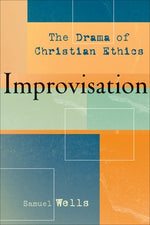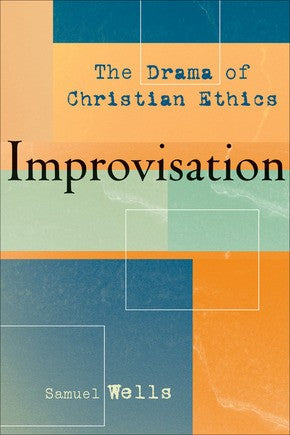- Home
- Improvisation: The Drama of Christian Ethics
Improvisation: The Drama of Christian Ethics
Couldn't load pickup availability
- Binding:
- Paperback
- ISBN:
- 9781587430718
- Publisher:
- Brazos Press
ISBN: 9781587430718
Type: Paperback
"This book is conversant both with academic issues and with the liturgical and pastoral practices of congregational ministry. . . . Wells's account represents a significant advance for the discipline of Christian ethics. . . . [He] seems well equipped to carry out his ethical improvisations to the great benefit of both church and world."--David S. Cunningham, Theology Today
"Improvisation." We think of jazz--some bebop master following his horn in the genius of the moment. Or theater--an actor striking that authentic note by responding, on the spot, to the lines that came before his. But what does improvisation have to do with ethics?
Samuel Wells defines improvisation in the theater as "a practice through which actors seek to develop trust in themselves and one another in order that they may conduct unscripted dramas without fear." Wells suggests that such a definition is highly appropriate to Christian ethics.
He establishes theatrical improvisation as a model for Christian ethics, a matter of "faithfully improvising on the Christian tradition." The Bible is not so much a script to rehearse as it is a "training school" that shapes the habits and practices of a community in action. Drawing on scriptural narratives and church history, he details six practices that characterize both improvisation and Christian ethics--including categories such as "forming habits,"questioning givens," and "reincorporating the lost." He concludes with specific examples of ethical issues, such as facing evil and the perils and promises of genetically-modified food.
Wells's fresh and imaginative discussion reinforces the goal of Christian ethics--not to "help someone act Christianly in a crisis" but to teach Christians to "embody their faith in the practices of discipleship all the time."
Endorsements
"This is one of the most relevant, stimulating and lucid books on Christian ethics to appear for some time. It provides an excellent introduction to current debates in Christian ethics while making its own vivid and sometimes controversial contribution. It is in many places profound and original, and it deserves to be widely read and discussed."--Duncan B. Forrester, University of Edinburgh
"A book on improvisation cannot be a book about improvisation, but it must 'be' that which it is about. No easy task, but both the content and execution of Improvisation do what the book says. With concepts such as 'blocking' and 'overaccepting,' Wells provides us with skills for the imagination that we might live more faithful (and humorous) lives as Christians. Like all great improvisers, Wells has a gift for telling the right but unexpected story at the right time. This extraordinarily sophisticated book can be read for profit by those well schooled in the literature of theology and ethics, but more important, this book will satisfy those who hunger and thirst for an account of what it means to live as a Christian in our day."--Stanley Hauerwas, Duke Divinity School
"Improvisation indeed. Bold, creative, and yet showing a deep mastery of his craft, Samuel Wells charts a fresh course for Christian theological ethics that is at once artful, contemporary, and faithful both to the Bible and to the best of Christian ethical reflection. While Wells rightly refuses to concede that Christian ethics is primarily about problem solving, he nevertheless offers back to the church its own imaginative resources for confronting the more intractable dilemmas of our age. This is a very important book."--Michael Hanby, Baylor University
"Samuel Wells is against originality, since he wants the church to do what comes naturally to it. Yet in this remarkable discussion of improvisation in Christian ethics he has given us a work of striking originality that will surely help the church to be more imaginative in its faithfulness and more faithful in its imagination."--Robert Song, University of Durham
- Weight:
- 0.8125 lb


